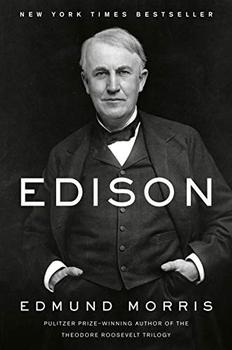Summary | Excerpt | Reviews | Beyond the Book | Readalikes | Genres & Themes | Author Bio

Critics' Opinion:
Readers' Opinion:
First Published:
Oct 2019, 800 pages
Paperback:
Nov 2020, 800 pages
 Book Reviewed by:
Book Reviewed by:
Peggy Kurkowski
Buy This Book
Chapter 1
At seventy-three, with his wartime career as president of the Naval Consulting Board behind him, Edison tried to make sense of a new intellectual order that challenged everything he had learned of Newtonian theory. Abstract thought did not come easily to him. "My line of sorrow," he wrote, "lies in the realm of technical science." He needed to feel things come together under his hands, see the filament glow, smell the carbolic acid, and—as far as possible for a near-deaf man—hear the "molecular concussions" of music.
Laws such as those of Faraday's electromagnetic induction and Ohm's relation of current, voltage, and resistance he understood, having applied them himself in the laboratory. But now, if only to slow as much as possible the entropy of his own particles (the fate of all systems, according to Lord Kelvin), Edison studied Einstein's general theory of relativity. The recent solar eclipse had persuaded him, along with the academic scientists he mocked as "the bulge-headed fraternity," that the theory was valid—even if it failed to suggest any correlation between his attempt to measure the total eclipse of 1878 and his subsequent perfection of incandescent electric light.
The urtext of the theory, as translated by Robert Lawson, defeated him after only eleven pages. "Einstein like every other mathematical mind," he scrawled in the margin of his copy, "has not the slightest capacity to impart to the lay mind even an inkling of the subject he tries to explain." He turned for help to an interpretive essay—Georges de Bothezat's "The Einstein Theory of Relativity: A Glance into the Nature of the Question"—and filled thirty-one notebook pages with scrawled paraphrases of its main points.
Gravitation is due to the retardation in velocity of the ultimate particle in passing through the fixed aggregates of matter. Ultimate particles fill the whole of space and proceed in every direction... .
He could imagine that at least in terms of his own observation, forty years before, of the thermionic emission of carbon electrons in a lightbulb after evacuation—a mysterious darkening since known as the "Edison Effect." It was about as far as he ever got in his search for a "new force" in electrochemistry. Disparaged at the time by his peers, he now knew that he had discovered, if not recognized, the phenomenon of radio waves eight years before Heinrich Hertz.
Wireless waves cannot proceed thru space but thru Matter in combination with the ultimate particle... . From this, if true, all matter is formed of the same material.
Edison had once teased a science fiction writer with the notion of interchanging atoms of himself with those of a rose. He noted that Einstein envisaged particles in space with common axes converging into solidly constituted "rings," while others remained ethereal. Hence the "primal ring" of the solar system, with its interplanetary nothingness.
We now have matter in a form which is polar & capable of producing what we call Magnetism & Electricity.
The religion boys, of course, would protest that what drew particles together was the will of God. Edison was as ready as Einstein to believe in a "Supreme Intelligence" made manifest by the order and beauty of the stars, and equally reluctant to personalize it: "I cannot conceive such a thing as a spirit." The furthest he would go in the direction of metaphysics was to imagine the subcellular particles of a human being as "infinitesimally small individuals, each itself a unit of life."
These units work in squads—or swarms, as I prefer to call them—and ... live for ever. When we "die" these swarms of units, like a swarm of bees, so to speak, betake themselves elsewhere and go on functioning in some other form or environment. If the units of life which compose an individual's memory hold together after that individual's death, is it not within the range of possibility ... that these memory swarms could retain what we call the individual's personality after the dissolution of the body?
Excerpted from Edison by Edmund Morris. Copyright © 2019 by Edmund Morris. All rights reserved. No part of this excerpt may be reproduced or reprinted without permission in writing from the publisher.





The Flower Sisters
by Michelle Collins Anderson
From the new Fannie Flagg of the Ozarks, a richly-woven story of family, forgiveness, and reinvention.

The House on Biscayne Bay
by Chanel Cleeton
As death stalks a gothic mansion in Miami, the lives of two women intertwine as the past and present collide.

The Funeral Cryer by Wenyan Lu
Debut novelist Wenyan Lu brings us this witty yet profound story about one woman's midlife reawakening in contemporary rural China.
Your guide toexceptional books
BookBrowse seeks out and recommends the best in contemporary fiction and nonfiction—books that not only engage and entertain but also deepen our understanding of ourselves and the world around us.